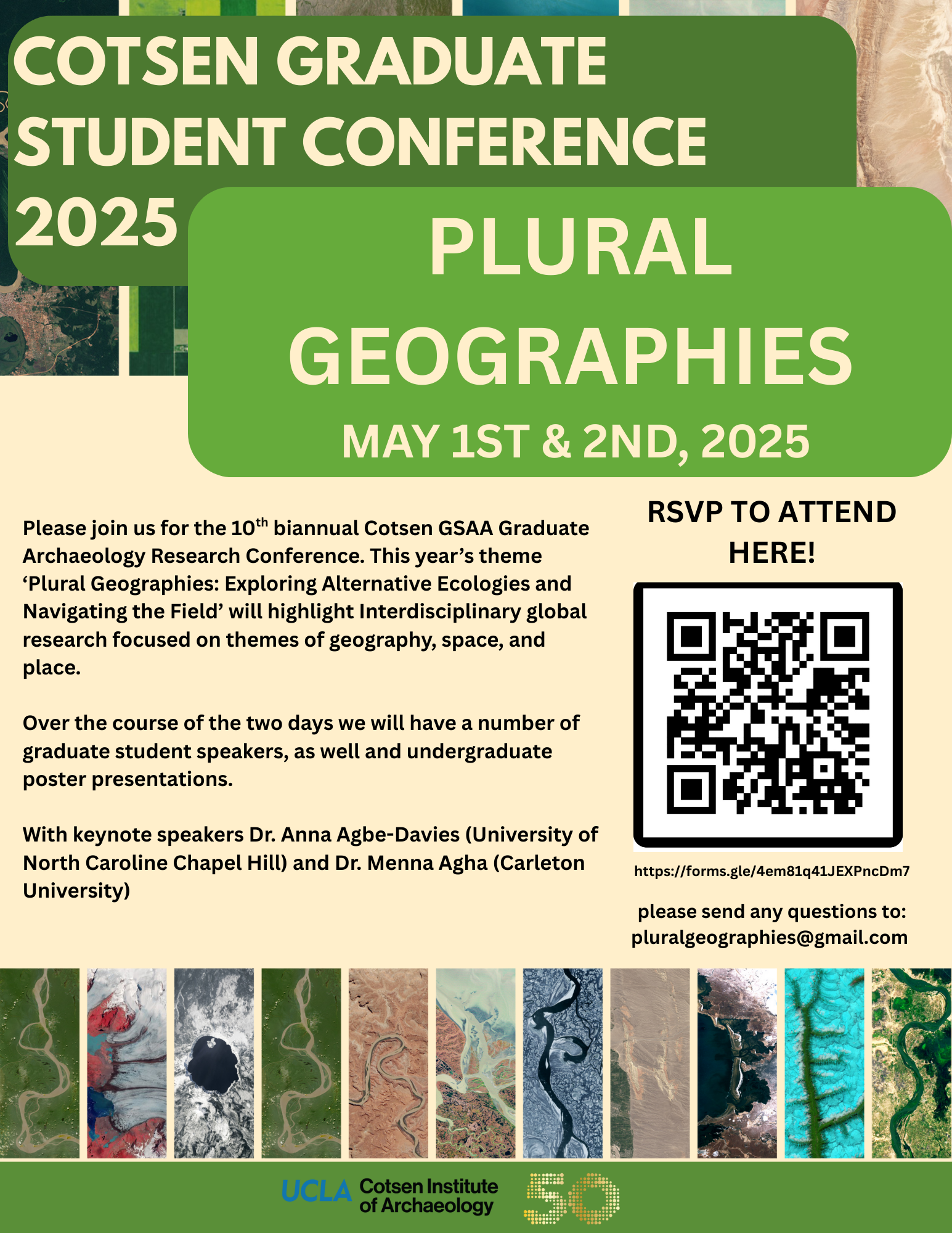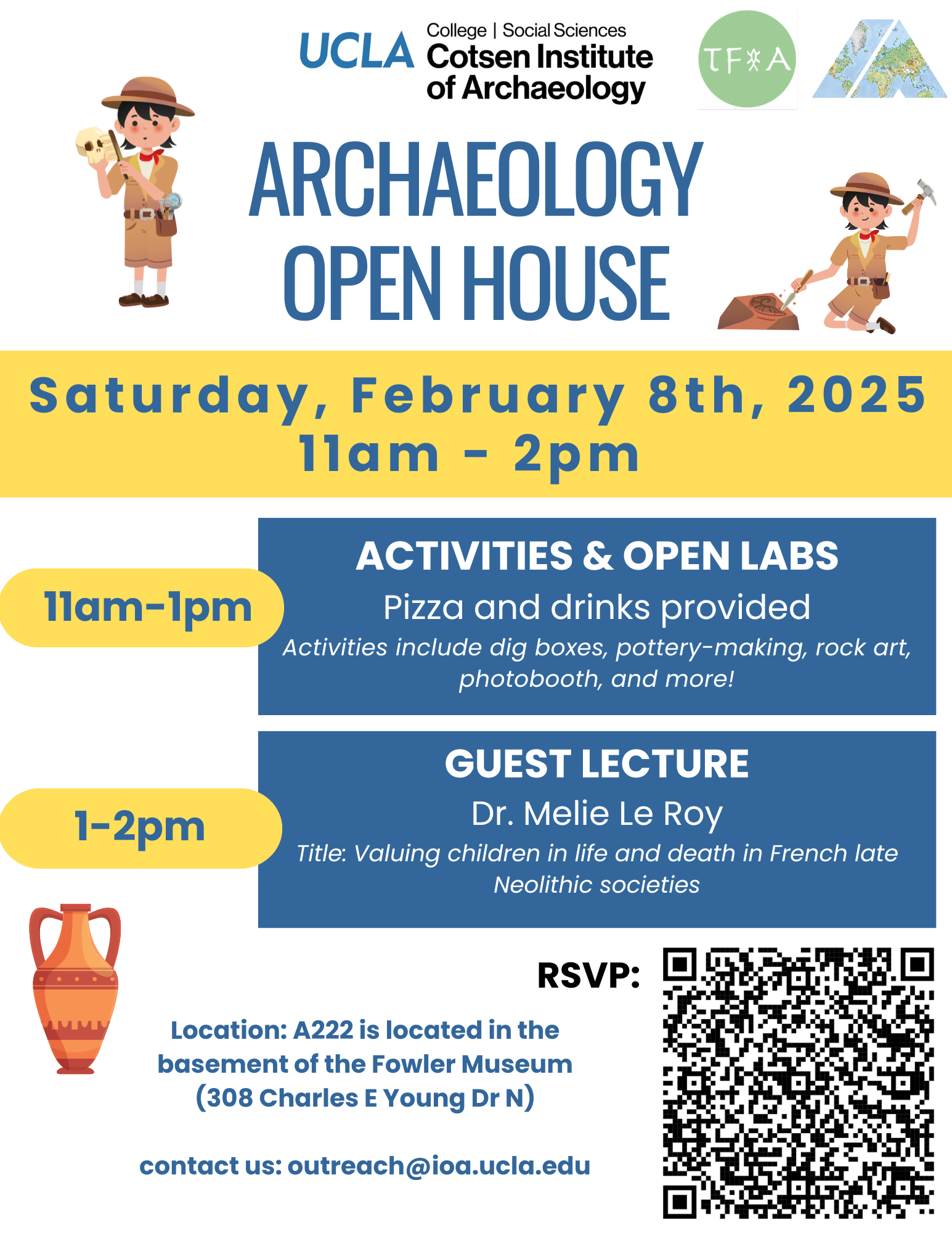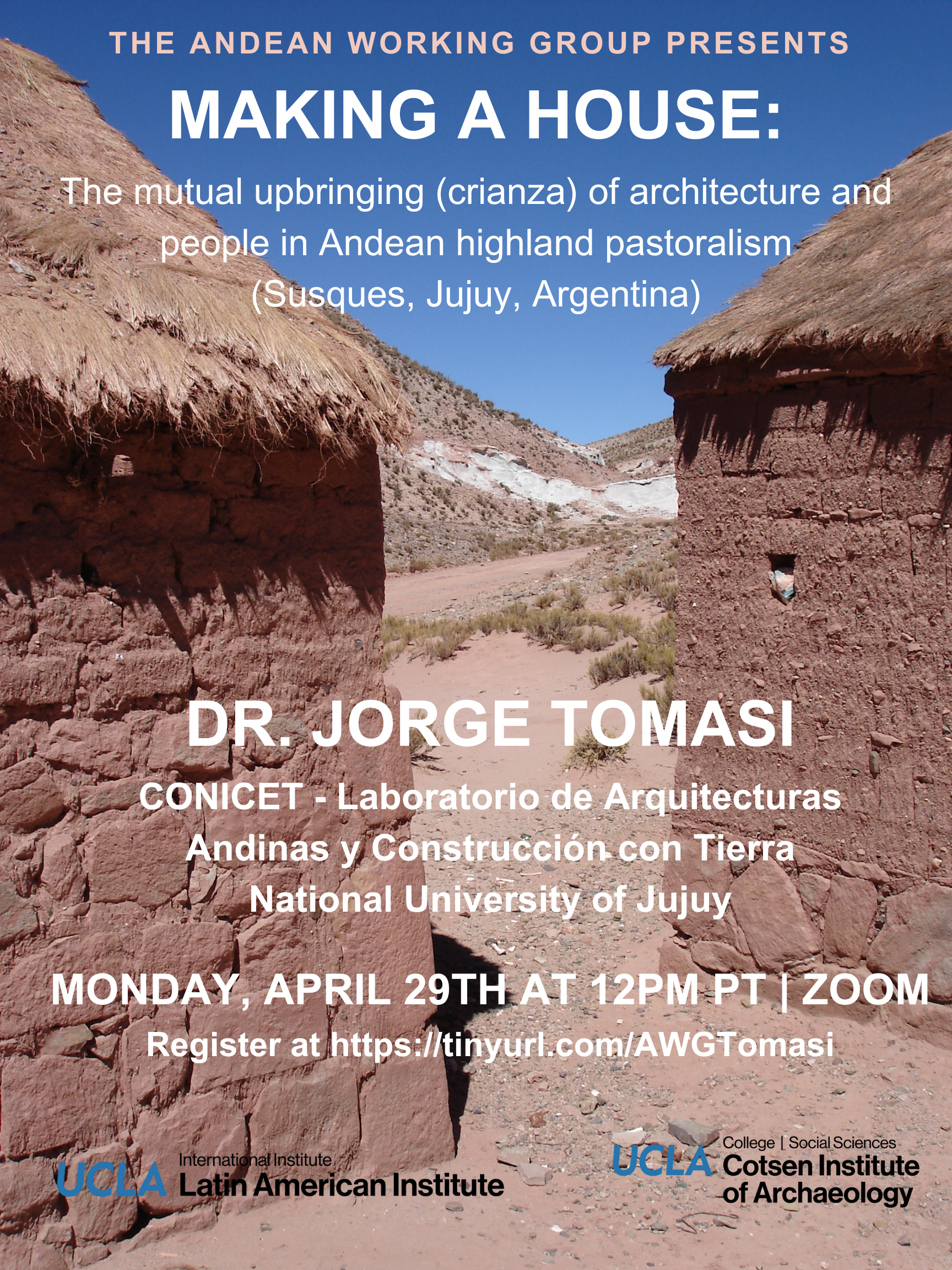Past Events
Interested in Cotsen events? Sign up for our mailing list.The Andean Working Group presents "Kubler in Cuzco: Shaping Architectural Modernity After the 1950 Earthquake" by Dr. Lucia Allais, Associate Professor in the Columbia University Graduate School of Architecture, Planning, and Preservation.
Registration is required for in-person and virtual participation. Register at tinyurl.com/AWGAllais
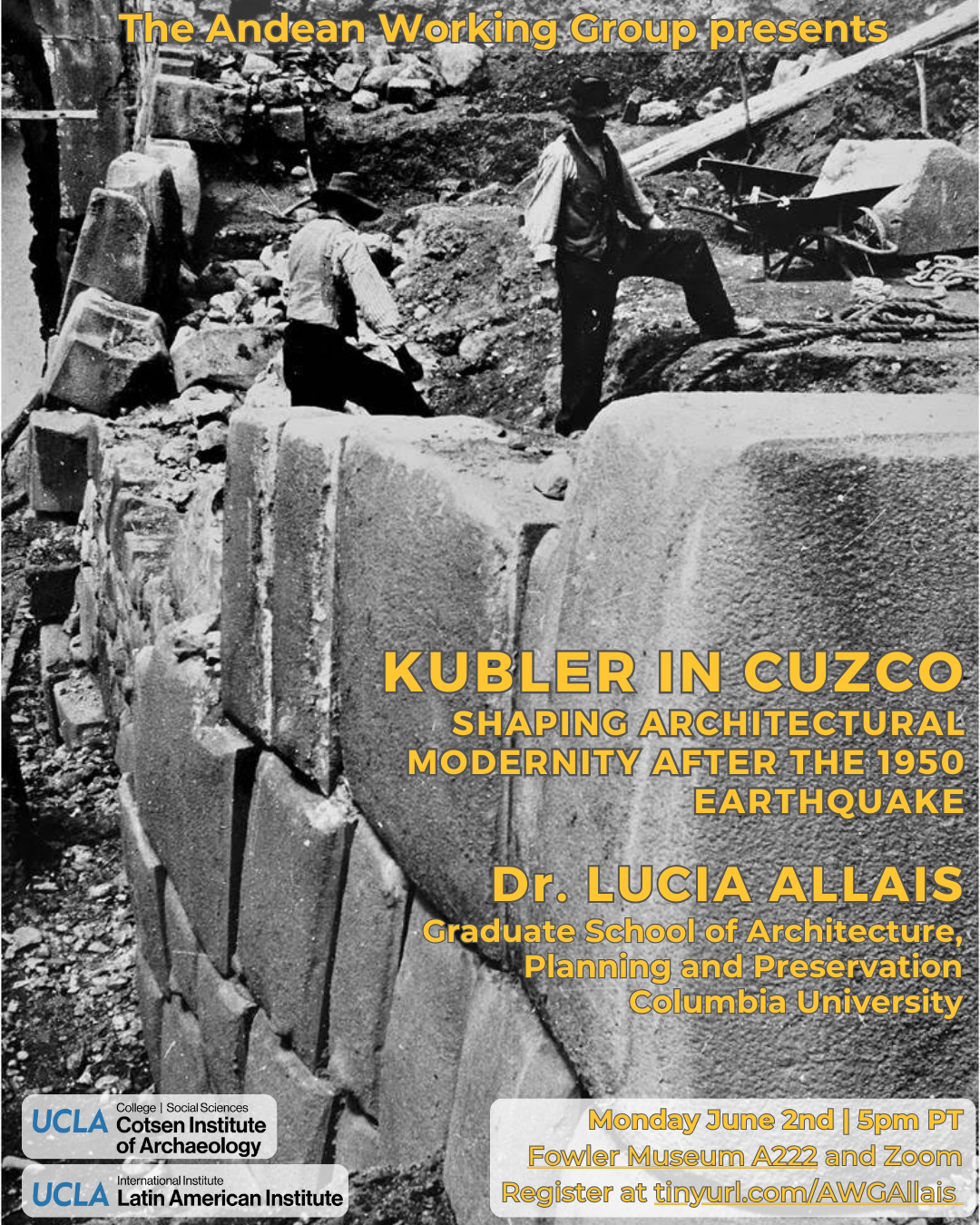
This event is co-sponsored by the UCLA Latin American Institute and the Cotsen Institute of Archaeology.
Download the flyer here.
Contact Alba Menéndez Pereda
Email albamenendez@ucla.edu
Phone
The 2025 Cotsen Institute of Archaeology Graduate Student Conference centers on the theme of “Plural Geographies: exploring Alternative Ecologies and navigating through the Field.” This topic is meant to provide a platform for alternative approaches to archaeological methods. With this year’s theme, the conference organizing committee encourages graduate students to reflect, explore, and challenge the field of archaeology and related fields, especially through spatial, placebased, land-based, ecological, or geographical means, construed broadly. We root our discussions within the realms of geography, space, and place in order to interrogate the ways in which archaeology is necessarily intertwined with discussions of land, land use, ecology, political ecologies and more across multiple scales, from the material level of excavation and other forms of land-based research to its engagement and entanglement with the construction of nations and inscription of borders on a global scale. We look forward to welcoming discussion on systemic, disciplinary, and personal approaches to negotiating bias, identity, and deep-rooted legacies of colonialism within the field.
Plural Geographies features two keynote speakers who together represent diverse scholarly backgrounds and intellectual engagements with the conference theme: Dr. Anna Agbe-Davies (UNC-Chapel Hill), a historical archaeologist with a particular focus on African diasporic contexts, and Dr. Menna Agha (Carleton University), an architect and scholar of social justice within the field of architecture. They will be joined by 13 papers presentations, roundtable and breakout sessions, undergraduate poster session, and a film screening from graduate students and community across different fields working around the globe.
Registration for in-person or Zoom required.
For more information on papers and the timing of sessions and speakers, please see the schedule. For any inquiries, questions, or comments, please email the Organizing Committee at pluralgeographies@gmail.com.
Contact Graduate Student Conference Committee
Email pluralgeographies@gmail.com
Phone
This event has reached full capacity and is no longer accepting reservations - please email outreach@ioa.ucla.edu for information about future events.
Open House for K-12 students
Visit the labs, participate in a variety of activities including dig boxes, pottery-making, rock art, photobooth, and more!
Contact Victoria Newhall
Email outreach@ioa.ucla.edu
Phone
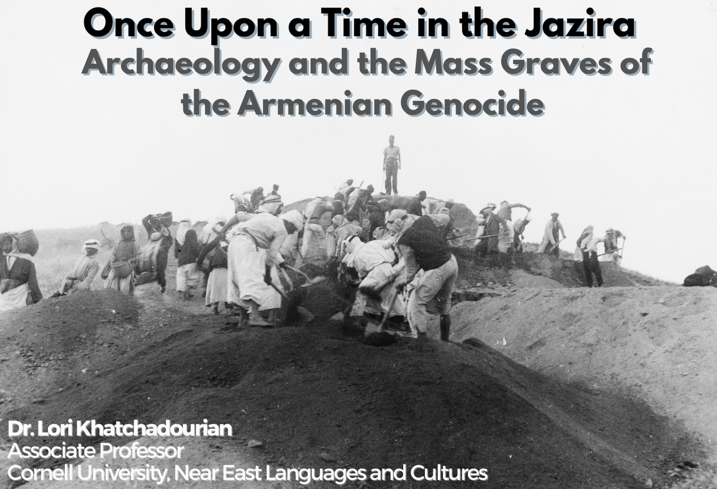
ABSTRACT: For the dead, and for the wretched who lived to give testimony to the Armenian Genocide, the Jazira region of northeastern Syria was hell on earth, its arid expanse and biblical rivers bloated with bodies and bones—the victims of Ottoman deportations and massacres. But for archaeology, which Laurent Olivier has dubbed the “consummate once-upon-a-time discipline”, the Jazira has been more akin to an Eden, brimming with vestiges of the deep past. This talk explores the practice of archaeology in this necrogeography. I disclose and diagnose how, for nearly a century, archaeology has remained virtually silent on the mass graves of the Jazira. Analysis centers on the mound of Tell Fekheriye, where several teams have uncovered and disregarded skeletal remains from the 1915-1916 massacres ever since the University of Chicago launched excavations in 1940. Among the world’s first mass grave exhumations, the Chicago project produced a collection of photographs, long buried in the archive. As archaeologists ignored the dark record of modernity in northern Syria, there emerged a parallel engagement with traces that I call survivor archaeology, a vernacular practice undertaken by genocide survivors and descendants to reckon with the memory of atrocity through the excavation, collecting, memorialization, and circulation of bones.
BIO: Trained as an archaeologist, Dr. Katchadourian's research spans the fields of archaeology, social anthropology, and critical heritage studies, with a particular focus on Armenia, the South Caucasus, and neighboring regions. Her work explore problems of empire, materiality, the archaeology of modernity, Soviet socialism and its aftermath, and the politics of heritage. Her research and teaching are temporally expansive, extending from the deep past to the present, and attentive to the ways in which the materiality of the past shapes contemporary politics, economics, and ethics. She pursue these concerns using the methods of archaeology, ethnography, spatial analysis, and archival research.
Contact Sumiji Takahashi
Phone
The Andean Working Group presents "Beyond the Horizon: Pericentric Complexity in the Chavín Phenomenon at Atalla, Peru" by Dr. Michelle Young, Assistant Professor in the Department of Anthropology at Vanderbilt University.
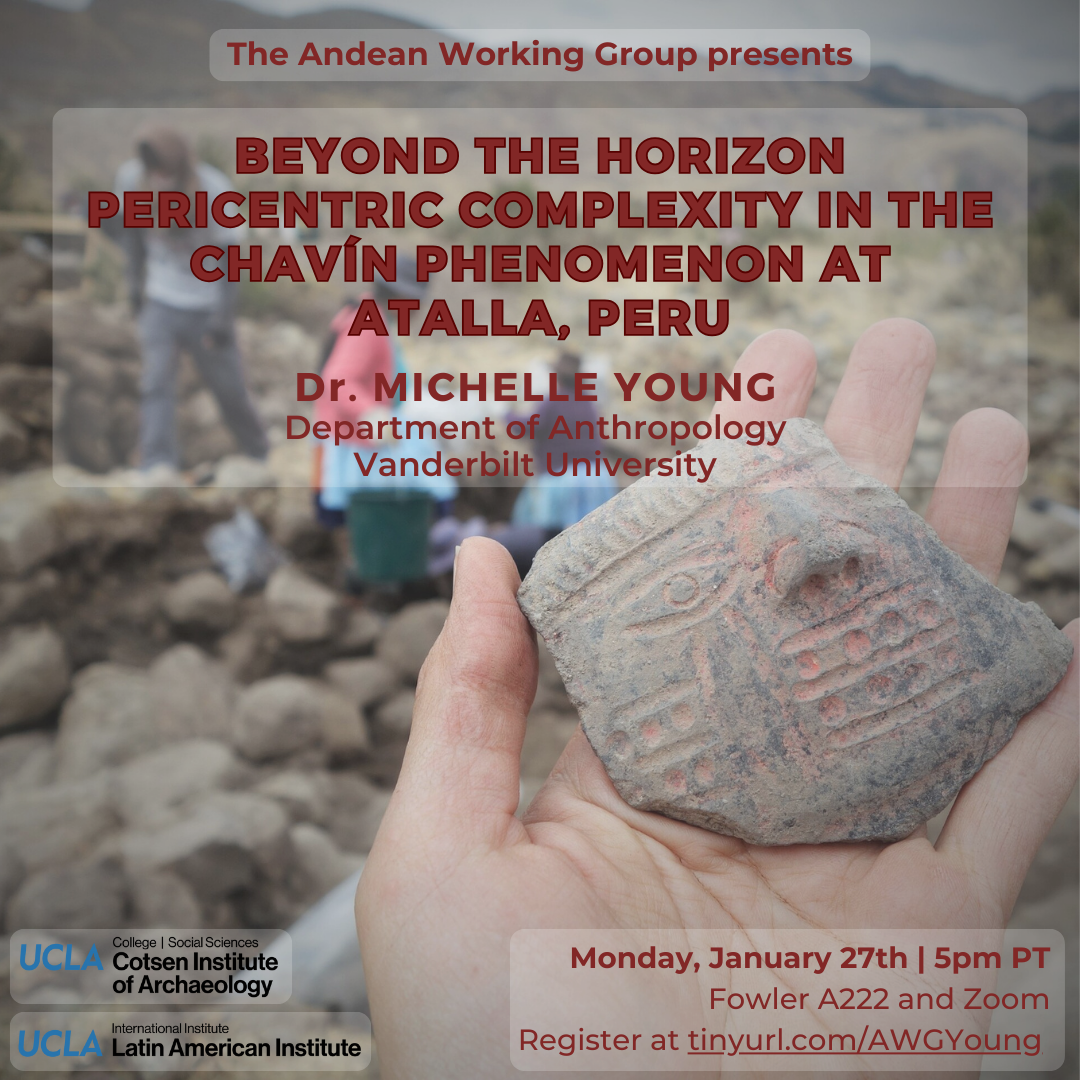
Registration is required for in-person and virtual participation.
Register at tinyurl.com/AWGYoung
This event is co-sponsored by the UCLA Latin American Institute and the Cotsen Institute of Archaeology.
Contact Gabriel Silva Collins
Email gsilvacollins@g.ucla.edu
Phone
Andean Working Group is pleased to announce Dr. Vladimir Gil Ramón's talk titled "Andean Environmental Conflicts, Risks, Disaster, and Development in the Anthropocene." Dr. Gil Ramón is a faculty member in the Department of Social Sciences and Environmental Development Master's Program at PUCP (Pontificia Universidad Católica del Perú). His research explores relationships between mining industries, the nation-state, and environmental risk, with publications including the 2020 book Fighting for Andean Resources. This AWG talk is an event rescheduled from its original Spring 2024 date.
If you would like to attend this event, please register at the following link: https://tinyurl.com/yc85rb6w
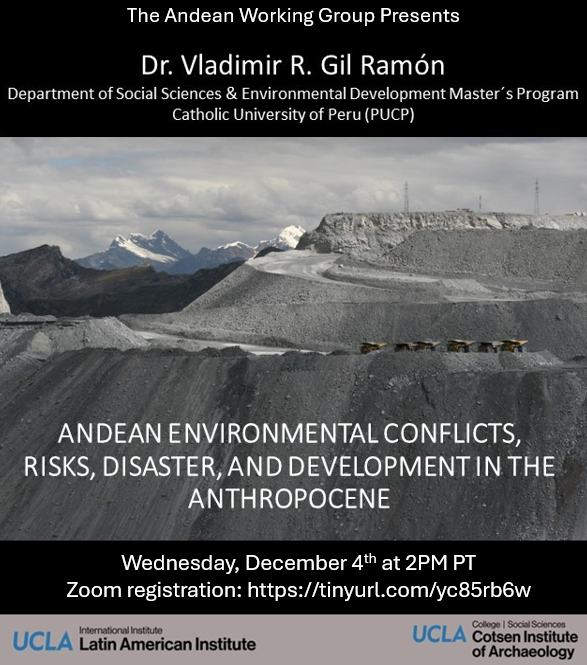
Contact Gabriel Silva Collins
Email gsilvacollins@g.ucla.edu
Phone
Archaeologies of Forced Migration:
Approaches, Case Studies, and Prospects
Cotsen Advanced Seminar, Cotsen Institute of Archaeology, UCLA
October 24–26, 2024
Organized by
Aaron A. Burke, Near Eastern Languages and Cultures
Li Min, Anthropology/East Asian Languages and Cultures
The symposium will be held over three days from the evening of Oct. 24th through Oct. 26th. Attendees are encouraged, though not required, to register for the event if they would attend any part of it, in order that we can maintain a record of attendees and communicate promptly in the event of any program changes. Please use the QR code or this link to do so.
The program has been made possible with generous support from UCLA’s Dean of Humanities, the Global Antiquity initiative, the Kershaw Chair of Ancient Eastern Mediterranean Studies, and the Department of Near Eastern Languages and Cultures.
![]() Cotsen Advanced Seminar - Forced Migration (2024-10).pdf
Cotsen Advanced Seminar - Forced Migration (2024-10).pdf
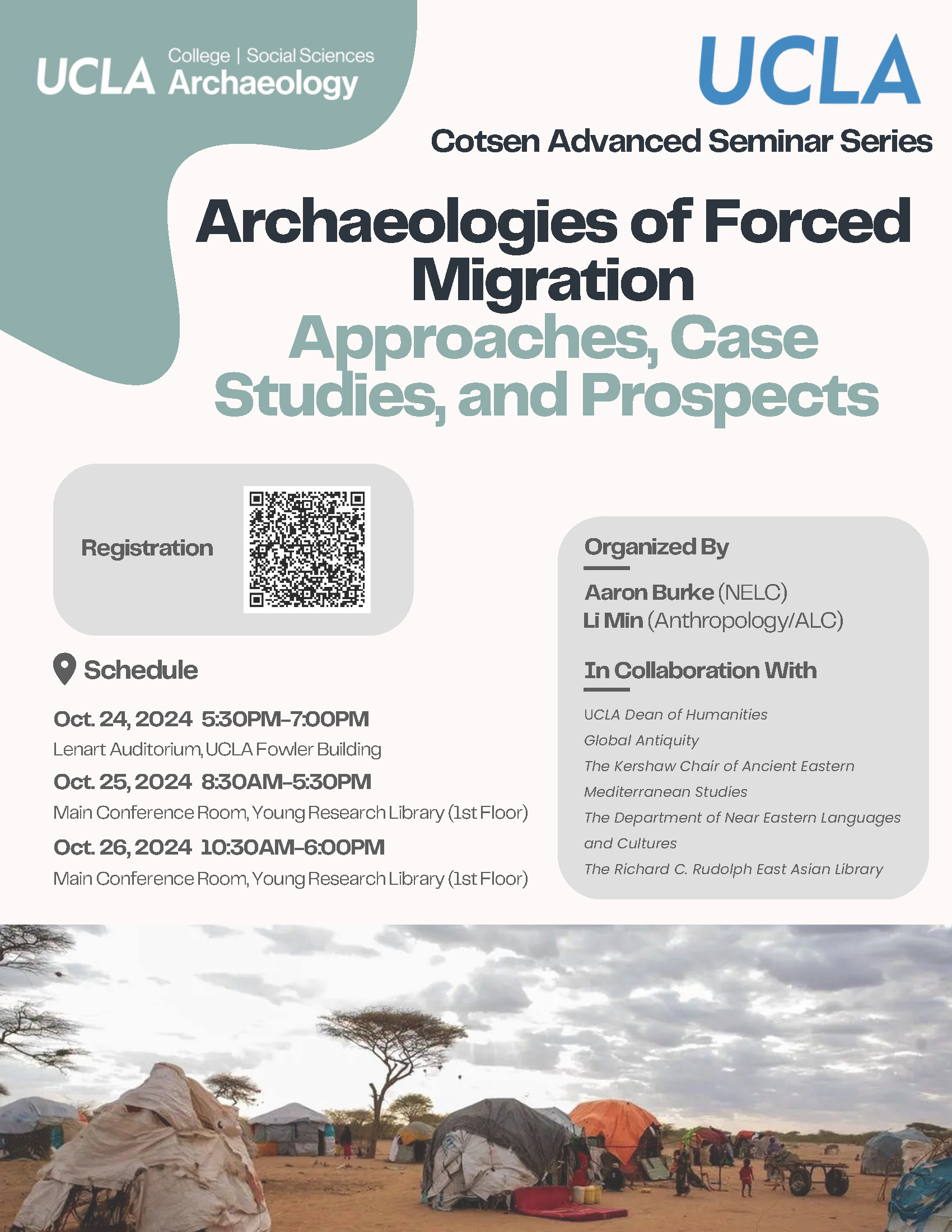
Contact
Phone
THIS EVENT HAS BEEN POSTPONED.
Please check back later for more information.
Please join us for the 10th biannual Cotsen Institute of Archaeology GSAA Graduate Archaeology Research Conference. This year's theme: 'Plural Geographies: exploring Alternative Ecologies and navigating through the Field' will highlight interdisciplinary global research focused on themes of geography, space, and place.
With keynote speakers Dr. Anna Agbe-Davies (University of North Carolina Chapel Hill) and Dr. Menna Agha (Carleton University)
Please register for virtual or in-person attendance here: https://tinyurl.com/UCLApluralgeo
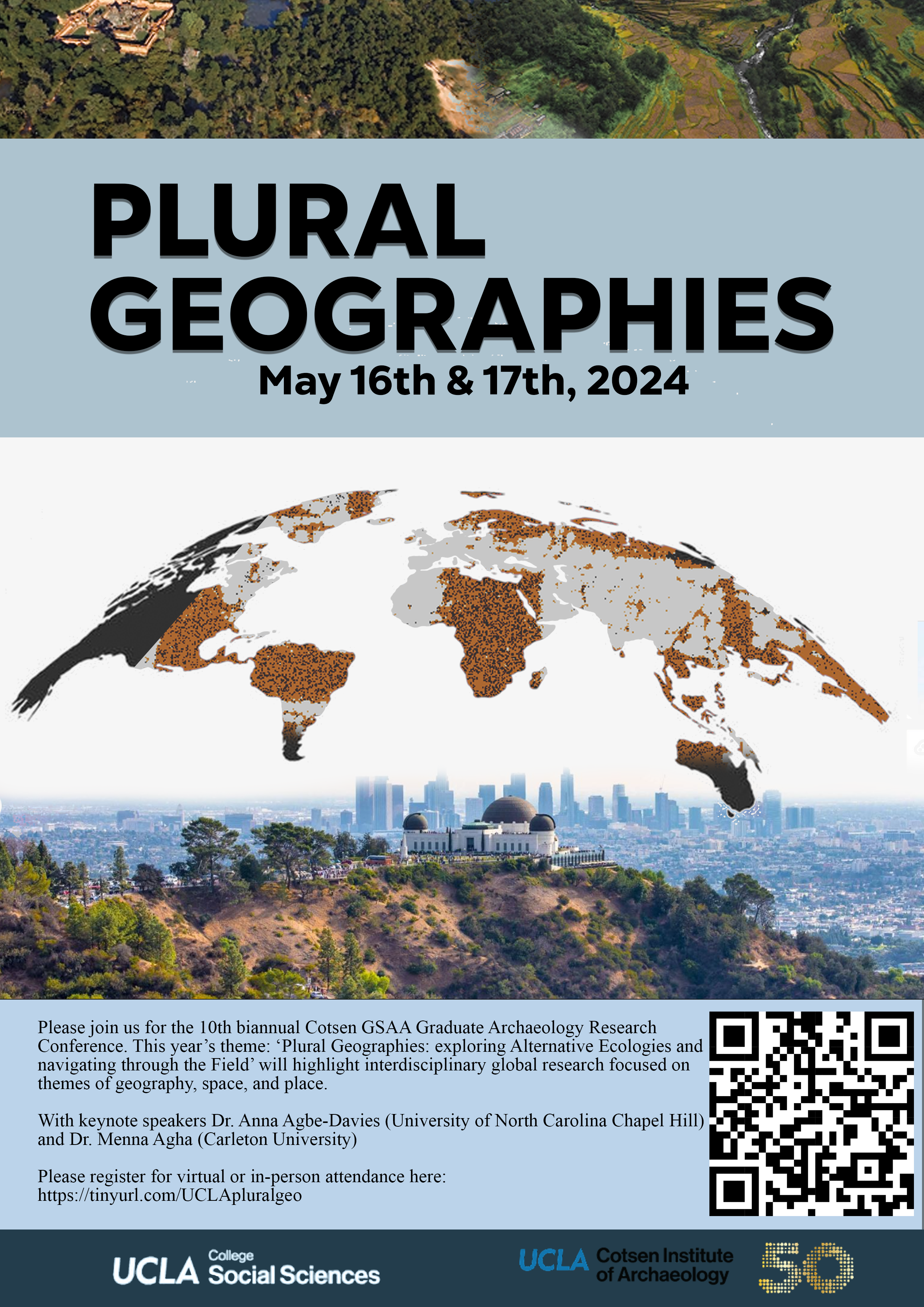
Contact Plural Geographies committee
Email pluralgeographies@gmail.com
Phone
The Andean Working Group presents Making a House: The mutual upbringing (crianza) of architecture and people in Andean highland pastoralism (Susques, Jujuy, Argentina) with Dr. Jorge Tomasi from CONICET - Laboratorio de Arquitecturas Andinas y Construcción con Tierra, National University of Jujuy.
Register at https://tinyurl.com/AWGTomasi
Cosponsored by the UCLA Latin American Institute and the Cotsen Institute of Archaeology
Contact Rachel Schloss
Email rachelschloss@g.ucla.edu
Phone
A virtual panel discussion organized by Professor Ioanna Kakoulli, Acting Director, UCLA SNF Center for the Study of Hellenic Culture.
The Eastern Mediterranean, a cradle of ancient civilizations, stands at the precipice of an unprecedented challenge. Coastal areas, including the island of Cyprus and Greece, like other regions in the Mediterranean are witnessing the relentless advance of the sea due to climate change. Rising sea levels, heightened temperatures, extreme weather events, and marine erosion are endangering archaeological sites, Byzantine relics, and other critical historic landmarks. With climate data projecting a rise of 90 cm in sea level by 2100 in the Mediterranean, the risk to our global heritage is immediate and undeniable.
This panel aims to address/initiate discussion on two critical aspects:
- Highlighting the Threat: An in-depth look at how rising sea levels, temperature extremes, and other climate phenomena threaten cultural landmarks, particularly in low-lying coastal zones of Cyprus and Greece
- Bridging the Awareness Gap: A pressing need to use climate data in decision-making for the cultural heritage sector and enhancing awareness on the imminent risks
Speakers:
Demetrios Athanasoulis, Ephorate of Antiquities of Cyclades, Greece
Nikolas Bakirtzis, Cyprus Institute, Cyprus
Alessandra Bonazza, University of Bologna, Italy
Rohit Jigyasu, ICCROM, Rome, Italy
Anthi Kaldeli, Department of Antiquities, Cyprus
Athanasios Vafeidis, Kiel University, Germany
Nikolaos Zacharias, University of Peloponnese, Greece
Register for this Zoom event here
View additional details and a full schedule here.
This event is being held under the auspices of the Deputy Ministry of Culture of the Republic of Cyprus, the Embassy of Greece in the United States, the Embassy of the Republic of Cyprus in the United States, the Consulate General of Greece in Los Angeles and the Honorary Consulate of the Republic of Cyprus in Los Angeles. This program is co-sponsored by UCLA's Cotsen Institute of Archaeology and Global Antiquity Institute and is made possible thanks to the Stavros Niarchos Foundation (SNF).
Contact
Phone
- 1 of 7
- next ›



